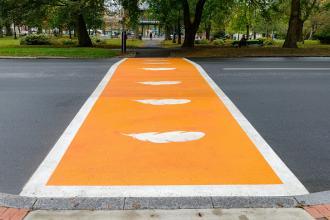Reflections on the importance of a name
Renaming the Powell River Division of Family Practice and opportunities for further action.
What power does a name hold? Is it just an abstract construct, or is the process of naming an object or place important? Does a name hold power beyond the printed or spoken word?
I live, work, and play in qathet, on the traditional lands of the Tla'amin people. The name “qathet” was gifted to the then Powell River Regional District by Tla'amin Elders in 2017. The name translates loosely as “coming together” or “working together” in ʔayʔaǰuθəm (Ayajuthem), the language of the Tla'amin Nation. The area is beautiful and diverse, and there is an oral record of thousands of names describing the local environment and landscape since time immemorial. Many of those names have also been recorded in print.[1]
qathet Regional District surrounds the city of Powell River, which was named after Israel Powell in 1955, and therein lies the problem. Powell (who never set foot in the area named after him) served as superintendent of the newly formed Department of Indian Affairs for the Province of British Columbia from 1872 to 1879.[1,2] He was instrumental in both banning the potlatch and setting up Indian residential schools. In his words, “‘Patlatches’ [sic], no doubt, not only retard civilizing influences, but encourage idleness among the less worthy members of a tribe, and will, I trust, by wise administration become obsolete in time.”[3]
In June 2021, Tla'amin Nation Hegus (Chief) John Hackett wrote a letter to the mayor and council of the City of Powell River requesting the city commit to change its name as part of its commitment to reconciliation.[4] A member of the Tla'amin Nation wrote about place names before colonization and how they illustrate a “deep connection to land and [reflect] the area’s cultural significance. It is important to consider the histories of place names, appreciating where they come from, what they mean, and what they can teach us about our environment. . . . [R]enaming holds the potential to acknowledge Indigenous history, celebrate Indigenous resilience and move forward together in a spirit of reconciliation.”[5]
This request stirred up strong emotions in the city, but the municipality has not yet granted the request.
Among the 94 Calls to Action of the Truth and Reconciliation Commission are clear calls to action for leaders in health care.[6] On 1 June 2019, Doctors of BC announced it had signed a declaration of commitment on cultural safety and humility in health services.[7]
The then named Powell River Division of Family Practice faced a problem. It was clear we needed to change our name, but as a not-for-profit society, any name change had to be voted on by members. In the initial request for a name change, the Tla'amin Nation had stated, “A referendum has no place in this process. Having the dominant culture decide whether the harms done to Tla'amin people and our rights outweigh their attachment to colonialism is a classic strategy to maintain the status quo.”[8] The danger then was that any vote that did not show a strong majority for a name change could be both hurtful and regressive.
The Division, therefore, embarked on an extensive period of education for its members. Among other activities, we discussed the In Plain Sight report,[8] which details evidence of systemic racism in health care.[9] After this education period, the membership voted 97% in favor of the name change, and on 28 June 2022 we officially became the qathet Division of Family Practice.
My own journey of cultural safety and humility is sometimes clumsy, awkward, and difficult, but I consider this name change to be one of the high points so far. My challenge to other divisions of family practice and health organizations is this: look at your name and how it originated, contact the local First Nation(s) on whose land you work and ask them what they think about the name, and reflect on your declaration of cultural safety and humility and how your name might be part of that. Names are important, but our actions are even more important.
hidden
This article has been peer reviewed.
 |
| This work is licensed under a Creative Commons Attribution-NonCommercial-NoDerivatives 4.0 International License. |
References
1. qathet Museum and Archives. Place name project. Accessed 6 July 2023. www.qathetmuseum.ca/place-names.html.
2. City of Powell River. Who was Israel Powell? Accessed 6 July 2023. https://powellriver.ca/pages/backgroundinfo.
3. Powell IW. Report of the superintendent of Indian affairs, for British Columbia, for 1872 and 1873. UBC Library Open Collections. Accessed 6 July 2023. https://open.library.ubc.ca/collections/bcbooks/items/1.0221711.
4. Hackett J. Re: Proposed name change [letter to mayor and council]. City of Powell River. Accessed 6 July 2023. https://powellriver.civicweb.net/FileStorage/26471907B6B949B9A5C11E6E799E2AB4-Appendix%20B%20-%20Letter%20from%20Tla_amin%20Nation%20-%20Propose.pdf.
5. Johnson H (sɛƛakəs), Van’t Schip K. The name matters. 2021. Accessed 6 July 2023. www.thenamematters.org/q-a.
6. Truth and Reconciliation Commission of Canada. Truth and Reconciliation Commission of Canada: Calls to action. Accessed 6 July 2023. www2.gov.bc.ca/assets/gov/british-columbians-our-governments/indigenous-people/aboriginal-peoples-documents/calls_to_action_english2.pdf.
7. Doctors of BC. Cultural safety and humility. Accessed 6 July 2023. www.doctorsofbc.ca/about-us/cultural-safety-humility.
8. Galinski P. Council chooses committee members to discuss possible name change for Powell River. Powell River Peak. 16 July 2021. Accessed 6 July 2023. www.prpeak.com/local-news/council-chooses-committee-members-to-discuss-possible-name-change-for-powell-river-3963521.
9. Turpel-Lafond ME. In plain sight: Addressing Indigenous-specific racism and discrimination in BC health care. Summary report. November 2020. Accessed 6 July 2023. https://engage.gov.bc.ca/app/uploads/sites/613/2020/11/In-Plain-Sight-Summary-Report.pdf.
hidden
Dr May is past chair and current physician lead of the qathet Division of Family Practice.

